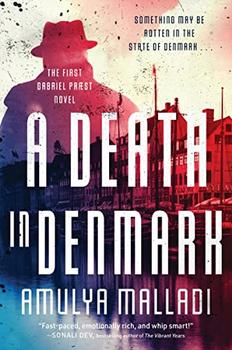Summary | Excerpt | Reviews | Beyond the Book | Readalikes | Genres & Themes | Author Bio

The First Gabriel Præst Novel
by Amulya MalladiLille Jødiske Annemarie (Little Jewish Annemarie)
Greater Copenhagen, October 1, 1943
There were twenty of them, huddled together in a truck that Lars Hansen used to transport vegetables from the farm to the market in Copenhagen. Rumbling down the road in the middle of the night, they were en route from Copenhagen to Hansensgård, the Hansen farm in Helsingør.
Annemarie was cradled on her father's lap. Sitting on the metal bed of the vehicle, he leaned against a sack of onions and garlic, the scent of which tickled Annemarie's nose. No one had spoken since they had started to drive. Although Annemarie had only just turned seven, she already understood how important it was to remain silent when she was told. She knew their lives depended upon it. Since the Germans had come to Denmark three years ago, she and her family had been living in fear. She heard her parents talk about it when they thought she was sleeping.
The truck stopped after what seemed like hours. Annemarie was tired and had dozed off for a while, so her legs were unsteady as she stood and gazed around.
There was a family of four awaiting them, a father and mother and their two children.
Annemarie's father helped her out of the truck, holding her in his arms. She wriggled out of them, not wanting to look like a baby in front of the new people, especially the girl who looked to be her age. She had light brown hair, loose around her shoulders, just like Annemarie. She was wearing a blue dress with white stockings and black shoes, just like Annemarie.
The girl smiled and introduced herself. "I'm Elvira, and this is my brother, Ib."
"I'm Annemarie," she said, her eyes lit with pleasure at finding a new friend.
Around her, the adults shook hands and introduced one another. Everyone looked tired, gray from stress; Helga Hansen, a stout smiling woman, tried to cheer them with her welcome.
"Come on inside where it's warm," she said, putting her arm around one of the women who was holding a baby. "You've had a long ride. The kitchen has a fire going and I have a meatball and dumpling soup simmering on the stove."
Elvira's older brother helped by carrying their bags inside the house, and Lars Hansen spoke to each of the adults and children as they settled into the kitchen.
"You are the same age as my Elvira," he said warmly when he shook hands with Annemarie. "She has some dolls you can play with."
Annemarie looked at her mother, who held a cup of coffee in her hands, and when she nodded, Annemarie almost clapped with glee.
"Let's go." Elvira grabbed Annemarie's hand and led her into her room.
The farmhouse was large and had space for all of them. Everyone slept that first night, scattered around the property. Many slept on beds of hay in the barn, some in the hall of the big house, and two in the large kitchen.
The next day, they'd taken quick baths with cold water in buckets and changed into clothes provided by the Hansens. Annemarie was given a dress that belonged to Elvira. It was white and green, and she loved it. It was now her favorite dress.
That evening they had dinner in the Hansen kitchen, all seated around a big table. It was like a party, Annemarie thought, seeing her parents and their friends happy and smiling for the first time in a long while.
"I wish we could just stay here until the Germans go away," she told Elvira when they went to the barn to see the new baby goat that had been born just two days before.
"Me too," Elvira said. "But you have to go on a boat to Sweden to be safe. There have been others who stayed with us and then left by boat. They always leave in the night so the German soldiers can't find them."
"I'm scared," Annemarie confessed. "What do you think the Germans do to the Jews when they catch them? Put them in prison?"
Excerpted from A Death in Denmark by Amulya Malladi. Copyright © 2023 by Amulya Malladi. Excerpted by permission of William Morrow Paperbacks. All rights reserved. No part of this excerpt may be reproduced or reprinted without permission in writing from the publisher.




The thing that cowardice fears most is decision
Click Here to find out who said this, as well as discovering other famous literary quotes!
Your guide toexceptional books
BookBrowse seeks out and recommends the best in contemporary fiction and nonfiction—books that not only engage and entertain but also deepen our understanding of ourselves and the world around us.